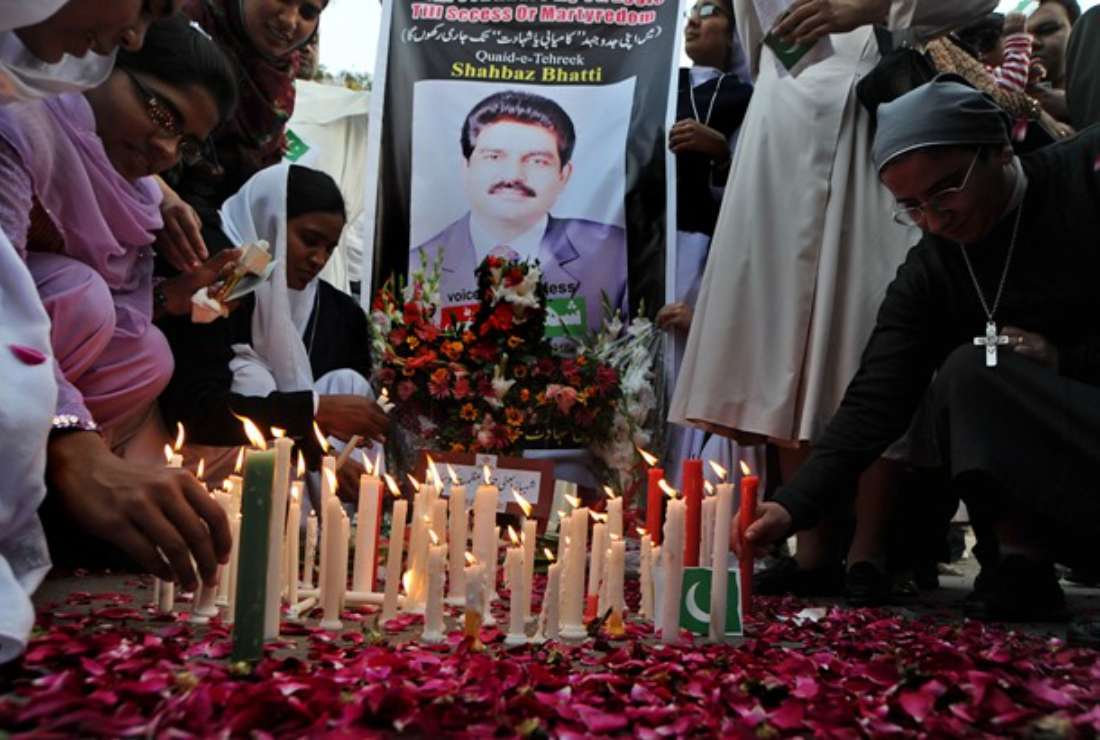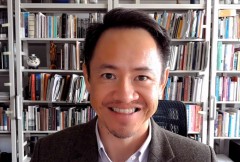
NEWSLETTERS
What’s happening in Asian Church
and what does it mean for the
rest of the world?



Updated: April 04, 2023 06:44 AM GMT

Pakistani nuns light candles during a rally in Lahore on March 12, 2011, for the slain Pakistani minority affairs minister, Shahbaz Bhatti. Bhatti, 42, an outspoken campaigner against Pakistan's Islamic blasphemy laws that carry the death penalty, was killed by Taliban militants as he left his family home in Islamabad on March 2, 2011. (Photo: AFP)
I remember March 2, 2011 — twelve years ago — as if it was yesterday. That morning, I woke up and as usual switched on the radio and my laptop to find out what the world’s news was that day. Within moments, the main headline news hit me between the eyes, and in my heart. My friend Shahbaz Bhatti, Pakistan’s Federal Minister for Minorities, had been assassinated.
In many respects, it was not a surprise. All of us who knew and worked with Shahbaz knew the risks he was facing. He received multiple death threats every day. Almost exactly three months earlier, the governor of Punjab, Salman Taseer, had been killed by his own bodyguard. Both men were targeted because of their courageous stand against Pakistan’s unjust and draconian blasphemy laws, and their support for a Christian woman, Asia Bibi, who had been sentenced to death under the law.
Shahbaz had requested a bullet-proof car and a more secure house because he knew the danger was real. Despite appeals to the Pakistani government by international politicians for better security for Shahbaz, no such protection was provided. Indeed, on the day of his assassination, his bodyguards did not show up for work.
In a sign of just how real the threats were, Shahbaz even took the step of recording a message that he requested to be broadcast in the event of his death.
In words that summed up the faith and courage that had been so consistent throughout his life as a grassroots human rights activist and politician, he said:
“These Taliban threaten me. But I want to share that I believe in Jesus Christ, who has given his own life for us. I know what is the meaning of the cross and I am following the cross. I am ready to die for a cause. I am living for my community and suffering people and I will die to defend their rights.”
"Although we knew the danger Shahbaz was in, his assassination was still of course a shock, particularly due to its horrific manner"
Those words, broadcast by the BBC after his murder, encapsulate the essence of Shahbaz and should stand as his epitaph.
But although we knew the danger Shahbaz was in, his assassination was still of course a shock, particularly due to its horrific manner. The killers drove to the street where he lived, blocked the route, and fired their Kalashnikovs through the windscreen. They then dragged the driver out and continued firing at Shahbaz through the side windows and doors.
It was reported that at least 25 bullets were fired, eight of which struck Shahbaz. Pamphlets were then scattered, declaring Shahbaz to be an “infidel Christian” who deserved death. According to doctors, he was pronounced dead on arrival at the hospital.
Even 12 years on, it is not easy to write this without my eyes welling up with tears. I had the immense privilege of working closely with Shahbaz. Working for the international human rights organization Christian Solidarity Worldwide (CSW), which specializes in religious freedom for all, I focused on Pakistan for at least five years.
During that time Shahbaz was an activist, the founder of the All Pakistan Minorities Alliance (APMA), and was at the forefront of campaigning for the rights of minorities of all religions and for women. We spoke several times a week, were in almost daily e-mail contact and traveled together in Pakistan.
Shahbaz with his mentor, the late Cecil Chaudhry, were CSW’s closest partners. Chaudhry, a highly decorated national war hero and former ace fighter pilot, had become a human rights campaigner after he had been denied promotion in the Pakistani air force because he was a Christian.
Chaudhry, who died of cancer just over a year after Shahbaz’s assassination, brought great wisdom that complemented Shahbaz’s idealism, but the two, both devout Catholics, were extraordinarily courageous leaders and Pakistan today is poorer without them.
Shahbaz and I shared several profound experiences together. On one occasion we missed a bomb together by five minutes in Islamabad. We had been meeting for dinner with others in the Marriot Hotel in Pakistan’s capital and had left just five minutes before a bomb exploded in the lobby.
On another occasion, Shahbaz took me to meet a little seven-year-old girl who had been brutally raped and tortured, simply because she came from a Christian family. Shahbaz was helping her and her family because no one else would.
In 2007, a Christian community in Charsadda in Pakistan’s North-West Frontier Province received threats from extremists, with an ultimatum: convert to Islam or face the consequences. I had been trying for several days to mobilize the international community’s efforts, but on the night the deadline was due to expire, I feared the worst. I telephoned Shahbaz and to my surprise, he told me he was in Charsadda.
“Thank God you have called,” he told me. The community was terrified, they expected an attack at any moment, and he had gone to be with them. That was so typical of Shahbaz.
But he also told me that the community had been praying. They felt alone, they felt that the rest of the world did not know or did not care. Then he said words that have stayed with me ever since, and which I remember every time I question for a second whether my efforts are worthwhile:
“Ben, the fact that you have telephoned means I can tell them that someone does know, someone does care, and someone is praying for them and speaking for them.”
“I live for religious freedom, and I am ready to die for this cause"
But Shahbaz was never just focused on his own Christian community. He defended the rights of other religious minorities — Hindus, Sikhs, Shia Muslims, and Ahmadiyya Muslims — and built bridges with Sunni Muslims who opposed extremism and intolerance and wanted a Pakistan based on the vision of its founder, Muhammad Ali Jinnah, who famously said: “You are free to go to your temples, you are free to go to your mosques or to any other places of worship in this State of Pakistan. You may belong to any religion, caste, or creed — that has nothing to do with the business of the state.”
In his final years, as a government minister, Shahbaz was invited by senior Islamic religious leaders to speak at large mosques, and he secured a ground-breaking statement from religious leaders denouncing terrorism. He launched a network of ‘district inter-faith harmony committees’ to encourage dialogue and unite communities across religious divides.
In October 2009, almost 18 months before his assassination, Shahbaz addressed CSW’s annual conference in London. As usual, his first request was for prayer. And he summed up his life’s vocation with these words:
“I live for religious freedom, and I am ready to die for this cause. We have a commitment to bring a change in the lives of people. We will bring a change in the lives of those who are living in darkness, we will bring a change in the lives of those who don’t have hope, and we will bring a smile on the faces of those living under severe harassment and victimization…”
He continued: “This is the key objective of my life — to live for those who are voiceless, who are suffering. We need to change the plight of those who are living in the darkness of persecution, victimization, and that is the commitment we made, to bring justice for those who are denied justice.”
Shahbaz challenged head-on the “forces of intolerance,” promising that in unity with others, “we will not allow you to capture our country.” He called on his audience to join him in this struggle: “Let’s pledge that we will work together to promote harmony and tolerance. We will bridge the gaps among different faiths. We will strengthen this world with the message of peace and tolerance.”
If only the world today would heed his message.
Almost every day I remember Shahbaz — not only his inspiring faith and courage, but also his remarkable humility and humor. He is an inspiration to me, and yes, he is a hero — and will hopefully be recognized by the Church one day as a saint and martyr.
"A cause for his canonization has been started and he should be recognized as a saint"
The day after his murder, I wrote an article in which I described him as “Pakistan’s Martin Luther King,” and I still believe that. Yet in my mind, he is not so much on a pedestal as alongside me as a companion. A cause for his canonization has been started and he should be recognized as a saint, but for me, he was my friend — and a constant awakener of my conscience.
Whenever I am in Rome, without fail I make it a priority to go to the Basilica di San Bartolomeo all’Isola, where Shahbaz’s personal Bible is on display in commemoration of modern-day martyrs. I try always to go to spend a few moments in front of his Bible, to say a prayer, light a candle and rededicate my life to the cause for which my friend gave his: the cause of human freedom, human rights and human life.
Ten years ago this year, I was received into the Catholic Church by another friend, spiritual mentor and hero of mine, Myanmar’s Cardinal Charles Bo, in Yangon’s St. Mary’s Cathedral on Palm Sunday 2013 — two years after Shahbaz’s murder.
There were many Catholics, living and in the past, who inspired and shaped my journey into the Church, but Shahbaz played a pivotal role and, through his example of extraordinary self-sacrifice, humility, service, courage and faith, moved me onwards in my own relationship with the Divine.
As we journey along the path of Lent, moving towards our Lord’s Passion, I know Shahbaz’s overriding message would be this: endure the suffering, in the hope and knowledge of the Resurrection.
We may not all be called to die to defend the rights of others, but we are for sure all called to live to do so.
The best way to honor my friend and brother Shahbaz today is to resolve to redouble our efforts to fight for basic liberty, freedom of conscience, human rights, dignity and life — for people of every faith and none.
That’s what Shahbaz would be doing if he were still among us today. He lives on through our collective efforts — and every now and then I think I still feel his smile.
*The views expressed in this article are those of the author and do not necessarily reflect the official editorial position of UCA News.
Help keep UCA News independent
The Church in Asia needs objective and independent journalism to speak the truth about the Church and the state. With a network of professionally qualified journalists and editors across Asia, UCA News is just about meeting that need. But professionalism does not come cheap. We depend on you, our readers, to help maintain our independence and seek that truth. A small donation of US$2 a month would make a big difference in our quest to achieve our goal.















